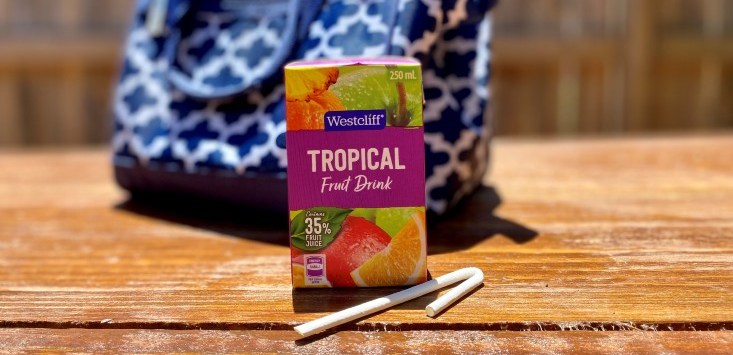
Aldi's Westcliff Tropical Fruit Drink complete with paper straw. Source: supplied.
Supermarket giant Aldi is providing paper straws with its own-label tropical juice boxes, or poppers, in an effort to further reduce distribution of single-use plastics.
A pilot for the paper straws will initially roll out in selected stores across New South Wales, replacing their plastic counterparts on Aldi’s Westcliff Tropical Fruit Drink cartons.
Early next year, paper straws will be provided with all Aldi’s home-brand drinks cartons nationwide.
Ultimately, the supermarket chain says this will remove more than 40 million plastic straws from the environment per year, equating to 18 tonnes of single-use plastic
In a statement, Dan Warner, buying director for drinks at ALDI Australia said juice boxes remain a staple of kids’ lunchboxes. However, more and more parents are striving to reduce the levels of single-use plastics in their households.
The idea is to reduce single-use plastics without sacrificing convenience or compromising on cost, he said.
“It’s crucial to us to deliver the best quality at the most affordable prices. When we can do that, make a change that benefits the planet and doesn’t cost our customers more, it’s a no-brainer.”
This is just the latest move in Aldi’s sustainability drive. In 2020, the supermarket giant removed single-use plastic tableware from its shelves in all Aussie stores.
It has also replaced it’s cotton buds with plastic stems to those using paper instead.
Aldi is striving to reduce the amount of single-use plastics in its own-label range by 25% by 2025.
It is also aiming to send zero food waste to landfill by 2023, and zero waste at all to landfill by 2025.
Aldi’s operations are already 100% powered by renewable energy, having secured 10-year power purchasing agreements with wind farms in Victoria and NSW.
By the end of 2021, it will have installed more than 100,000 solar panels on the roofs of 274 Aussie stores and six warehouses.
“We challenge ourselves to be bold in our commitments, and that means assessing every single component of the supply chain and finding all the ways we can make a positive change,” Warner said.
Handpicked for you

Three ways today’s businesses can prove they are sustainable beyond net-zero



COMMENTS
SmartCompany is committed to hosting lively discussions. Help us keep the conversation useful, interesting and welcoming. We aim to publish comments quickly in the interest of promoting robust conversation, but we’re a small team and we deploy filters to protect against legal risk. Occasionally your comment may be held up while it is being reviewed, but we’re working as fast as we can to keep the conversation rolling.
The SmartCompany comment section is members-only content. Please subscribe to leave a comment.
The SmartCompany comment section is members-only content. Please login to leave a comment.